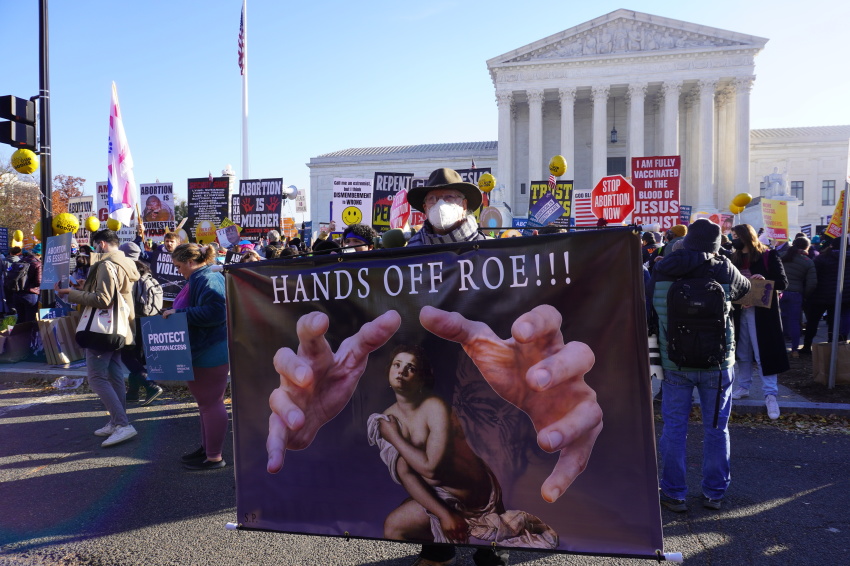56% of Americans support abortion restrictions after 15 weeks: poll

While most Americans say they're opposed to overturning the 1973 United States Supreme Court decision that legalized abortion nationwide, most Americans support limits on abortion after 15 weeks gestation, a new poll has found.
The Harris poll, conducted in conjunction with Harvard University’s Center for American Political Studies and obtained exclusively by The Hill, found that 54% of Americans opposed overturning Roe v. Wade, the 1973 Supreme Court decision that legalized abortion nationwide, while 46% support a reversal of the controversial ruling. The poll surveyed 1,989 registered voters between Nov. 30 and Dec. 2, as the Supreme Court heard oral arguments in Dobbs v. Jackson Women’s Health, a case surrounding Mississippi’s 15-week abortion ban.
However, the poll also showed a majority of Americans support limiting abortions to the first 15 weeks of pregnancy. When respondents were given additional context, namely that Roe v. Wade allowed women to have abortions within the first 24 weeks of pregnancy, 38% expressed support for letting the decision stand while 32% supported repealing the decision entirely, thereby letting each state decide whether to ban abortion altogether. Another 24% of respondents said they wanted abortion limited after 15 weeks of pregnancy.
Combining the 32% of Americans who want to reverse Roe v. Wade and its allowance of abortions until 24 weeks into a pregnancy with the 24% of Americans who want Roe v. Wade amended to only permit abortions within the first 15 weeks of pregnancy reveals that 56% of Americans want to limit abortions to the first 15 weeks of pregnancy or sooner. On the other hand, an additional 8% of Americans want to allow abortions up to 36 weeks into a pregnancy.
The Harvard-Harris poll yielded similar findings to The Associated Press-NORC Center for Public Affairs Research survey, conducted in June, shortly after the Supreme Court announced that it would take up the Dobbs case. In the June poll, 57% of Americans said that they wanted abortion to remain legal in all or most cases but support for the legality of abortion was lower in later stages of pregnancy.
Sixty-one percent of Americans believed that abortion should be legal in all or most cases in the first trimester of pregnancy. That number dropped to 34% when asked about the second trimester and 19% for the third trimester.
In Dobbs, a ruling in favor of the state of Mississippi, which is asking the Supreme Court to reverse a lower court decision striking down the state’s 15-week abortion ban, would significantly weaken the precedent set by Roe v. Wade and upheld in the 1992 Supreme Court case Planned Parenthood v. Casey. Depending on how the decision goes down, it might uphold the Mississippi law while not scrapping the central finding of the longstanding decision, that women have the right to obtain an abortion up to a certain point, entirely.
Based on questions asked by the justices during oral arguments last week, pro-life advocates seemed optimistic that they will rule in their favor. Following the oral arguments, pro-lifers praised Chief Justice John Roberts, a swing vote on the court, for bringing up how permissive U.S. abortion laws were compared to other countries. They also appreciated Justice Brett Kavanaugh’s listing of examples where the Supreme Court overturned precedent, seen as a rebuttal to the pro-abortion argument that the precedent of Roe v. Wade is sacrosanct.
The Supreme Court consists of six justices appointed by Republican presidents and three appointed by Democrats. Some expect that a majority of the Republican-appointed justices will side with Mississippi while all of the Democrat-appointed justices will likely find the state’s 15-week abortion ban unconstitutional.
If the justices decide in Mississippi’s favor, states will have more freedom to limit abortion to the first trimester, but abortion will not automatically become illegal in all 50 states. States that have permissive abortion laws on the books will continue to do so unless and until lawmakers in those states pass laws with stricter limits on abortion.
The Harvard-Harris poll also comes as less than one month remains in 2021, which pro-abortion activists have characterized as “the most devastating antiabortion state legislative session in decades.” Analysis from the Guttmacher Institute concluded that 61 pro-life bills were passed in the first four months of 2021. Updated statistics provided by the Guttmacher Institute in the middle of 2021 found that 90 “abortion restrictions” had been passed at the state level in the first half of the year.
Perhaps the most notable pro-life law passed at the state level in 2021 is Texas’ six-week abortion ban. The Supreme Court has allowed the law to go into effect while litigation continues. A decision in the case of Dobbs v. Jackson Women’s Health is expected by June 2022 at the latest.
Ryan Foley is a reporter for The Christian Post. He can be reached at: ryan.foley@christianpost.com



























